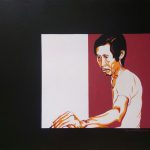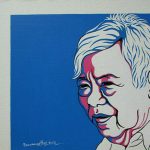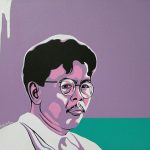The Irrawaddy Magazine |
- Who is Dawei Gyi, aka U Aung Lwin, a key suspect in the Malaysia drug haul?
- Study Warns of Public Backlash to China’s BRI Projects
- Artist Paints Portraits of Longtime Heroes
- USDP Urges Govt to Rethink Naypyitaw Office for UN Envoy
- Taxi Driver Sentenced to Death for Rape and Murder of FDA Worker
- Yangon’s Govt and Parliament at Odds
- ICC Gives Myanmar Deadline Over Rohingya Case Jurisdiction
- North, South Korea Discuss Reunion Meetings For Divided Families
- ‘Hate Narratives’ from Abroad Drive Myanmar Communities Apart, Suu Kyi Says
| Who is Dawei Gyi, aka U Aung Lwin, a key suspect in the Malaysia drug haul? Posted: 22 Jun 2018 07:45 AM PDT YANGON – Despite Myanmar police announcing on June 19 that they had arrested four suspects and were hunting three others following the seizure in Malaysia of 1.2 tons of methamphetamine and a quantity of heroin that had been shipped from Yangon port last month, authorities have still not released many details about the backgrounds of each of the suspects. According to a police statement, authorities have apprehended four suspects: U Min Naing, the owner of Nice Guy Clearance Service Agency, Haj Yassin and his brother-in-law Zeyar Hein, and most recently U Aung Lwin, also known as Dawei Gyi, in Tanitharyi Division on June 12. Meanwhile, the other three suspects, Jia Wai, aka Hnin Oo Lwin, from Tachileik in Shan State and her husband, Ahko Gyi, aka Ka Tone, and Hussein, aka Muhammad Hussein, continue to evade police capture. The police also disclosed they had seized moveable property and assets worth over 18 billion from six of the suspects and urged the public to inform them on the whereabouts of Jia Wai and Hussein. The last of the at-large suspects, Ahko Gyi, is believed to be in Malaysia. The four detained suspects were arrested in different locations around the country. The Irrawaddy has previously revealed that both Nice Guy Clearance Service Agency and an affiliate, U Kaung Trading, were owned by U Min Naing's family and that the company had acted as the shipper of the drug cargo, which was disguised in golden tea packages, for Haj Yassin. It also determined the two had been friends on Facebook for years. The initial police statement did not identify U Min Naing or U Kaung Trading's managing director, U Aung Soe Moe, as suspects. A second announcement from the Home Affairs Ministry officially identified U Aung Lwin and Jia Wai as suspects but provided few other details. The Irrawaddy understands that U Aung Lwin is better known as U Pyin Poe in Dawei Township and that he had almost completed a six-storey building in the town located in front of the Mediland Hospital. The project is believed to be a hotel business and U Aung Lwin had mentioned several times that a "new hotel was coming soon" on his Facebook account. He also owns a resort on Maungmakan Beach, a popular tourist destination, and land in Myitta, a sub-township in Dawei. Reliable sources, including those close to relatives of U Aung Lwin, or U Pyin Poe (which means "ant" in the Dawei language), told The Irrawaddy under condition of anonymity that he was a notorious drug lord in the region. U Aung Lwin was said to travel frequently, to Yangon, Thailand, Malaysia and Hong Kong. Sources from Dawei and the Facebook user history of "U Pyin Poe" indicate that he is close to Haj Yassin and the two had commented on each other's Facebook pages for years. The arrest of U Aung Lwin shocked and puzzled Dawei residents, as several matters were not explained in the Home Affairs statement. According to Dawei sources, U Aung Lwin had returned to Dawei, which is close to the border with Thailand, after his bank account in the neighboring country were frozen. He was travelling with a locally well-known monk from the Zeyyawadi monastery and a couple of Dawei businessmen. U Aung Lwin was arrested at the Ma Hlwa Taung border checkpoint, which is situated between Mon State and Tanintharyi Division. Sources from Dawei said that the two businessmen were also taken in by police for questioning. In an attempt to get confirmation of these reports from authorities, The Irrawaddy called police Col Nay Myo, who is the head of Tanintharyi division police, but no one answered the phone. U Aung Lwin is listed as a shareholder and also one of the founders of Tanintharyi Public Company Ltd, which operates hotel and other development projects. Although U Aung Lwin is obviously a wealthy individual in Dawei, his riches are not considered to have been reputably earned within the community and he is widely regarded as a medium-level drug lord. The Irrawaddy found that U Aung Lwin also operates a home security business that provides surveillance cameras, smoke detectors and automatic gate systems. His company is located on Waizayandar Street of South Okkalapa Township with a factory in the South Okkalapa Industrial Zone. The company is officially registered with the Directorate of Investment and Company Administration (DICA) as a "trading company" with a license that is due to expire in 2020. DICA's records show that he serves as the managing director and that his wife, Yee Yee Mon, and his sisters Aye Aye Lwin and Than Than Lwin serve as company directors. The Irrawaddy visited U Aung Lwin's office this morning but none of the directors named above were present and only two women employees were in the office. The Irrawaddy has seen a business license with U Aung Lwin's photo that was recently approved by the Yangon City Development Committee (YCDC) for 2018. Police announced that they have confiscated a total of 2.7 billion kyat of moveable and immobile assets from U Aung Lwin. It's unclear whether this includes assets held by his home security services business. The two employees confirmed that police came to the office a few days ago to question company officials. The company's showroom displays security cameras, door sensors and interior decorations. According to staff, the products were all imported from Malaysia via international shipping containers and the company has been operating for at least 6 years. It's unclear whether the company has any links to Haj Yassin or U Kaung Trading in narcotics smuggling to Malaysia. The Irrawaddy has learned the three men — Haj Yassin, Aung Lwin and U Min Naing — were friends on Facebook and had known each other for years. Some of them own at least two to three accounts with nicknames. The Home Affairs statement also did not elaborate on the connection between U Aung Lwin and Haj Yassin, and it's unclear whether both of them had possibly been collaborating on illicit drugs dealing for a long time. According to police, Haj Yassin and Zeyar Hein both acknowledged they were friends with U Aung Lwin in Malaysia and had contacted Jia Wai, the wife of Ahko Gyi, about the drug shipment. It did not specify where they had allegedly packed the drugs or the origins of the drugs. The Irrawaddy has viewed a police report that states a combined team of military officers and anti-narcotics police from Tachileik raided the house of Qin Jaimu (aka Jia Wai), that also served as a jewelry shop known as 3+1 U Kyaw Kyaw on June 13. The four-storey building is situated in Bogyoke Street, in the Mae Khaung quarter of Tachileik. Jia Wai fled before the police arrived at the building, leaving behind her four daughters and a son as well as four workers. The police seized four private cars, a Prado, Landcruiser, Toyota Alphard and Fortuner, 68.514 pounds of gold, 71.5 million Thai baht, over 110 million Burmese kyat, USD20,000 and CNY20,000. According to the Home Affairs statement, authorities said they had confiscated a total over 8 billion kyats in cash and valuables from Jia Wai. The post Who is Dawei Gyi, aka U Aung Lwin, a key suspect in the Malaysia drug haul? appeared first on The Irrawaddy. |
| Study Warns of Public Backlash to China’s BRI Projects Posted: 22 Jun 2018 06:28 AM PDT YANGON — New research warns that China’s Belt and Road Initiative and the China-Myanmar Economic Corridor could face stiff public resistance in Myanmar if the projects fail to engage local communities, as other Chinese-backed projects have in the past. "There is an explicit bias against Chinese investments in Myanmar," the researchers says, going on to warn both governments of “the potential local resistance they may face if their investment strategies do not consider the local context carefully." The policy brief, "Public perception of Chinese investment in Myanmar and its political consequences," released Monday, is the work of the International Growth Center, an academic policy research organization supported by UK Aid, Oxford University and the London School of Economics and Political Science. It concludes that the public in Myanmar has a strong general bias against foreign investment in the natural resource sector, but calibrated to its perceived impressions of the investor’s country of origin. Their survey found that respondents had a better opinion of firms from Japan than China, even when they failed to directly engage with local communities and collaborated with companies linked to Myanmar’s military.  “Chinese investors should be wary of existing negative attitudes,” they said, “but can improve their image by carefully selecting their local partners and engaging directly and actively with the affected communities.” Launched in 2013, the Belt and Road initiative, also dubbed the 21st century Maritime Silk Road, is Chinese President Xi Jinping's signature foreign policy project. Its aim is to build and improve trade and investment routes connecting China to Europe through central Asia, the Middle East and Russia. Situated between Southeast Asia and the Indian subcontinent, and between the Indian Ocean and China’s landlocked southwest, Myanmar is often seen as a key piece in the Belt and Road Initiative puzzle. Many also see Myanmar as a safer route to the Indian Ocean for China than it’s other best option, Pakistan. Earlier this year, Myanmar signed a memorandum of understanding with China to collaborate on the Economic Corridor project. The corridor would start out in China's Yunnan Province and pass through Mandalay in central Myanmar, from where one branch would head south to Yangon and another west to the Kyaukphyu Special Economic Zone in Rakhine State. Anti-China sentiment in Myanmar had hardened over six decades of rule by a military junta that counted Beijing among its few international allies and turned to China for much of the hardware it used to suppress dissent, grab people’s land and exploit the country’s natural resources.  That sentiment started to find a voice in 2011, when a new quasi-civilian government began a democratic reform process that freed up some space for a civil society. Myanmar soon became a more difficult place for Chinese firms — which regularly failed to engage with local communities — to do business. Under pressure from widespread public opposition, Myanmar suspended the $3.6 billion Myitsone dam project in 2011. Located below the confluence of the May Kha and Mali Kha rivers, the main tributaries of Myanmar’s most important waterway, the Irrawaddy, the dam would submerge important historic and cultural sites and was projected to cause irreversible damage to the country’s river system and to downstream farming communities. The Letpadaung copper mine has become another flashpoint of public resentment of China. Operated by China’s Wanbao Mining company, the site has been the scene of alleged forced evictions, land grabs and violently suppressed protests. The conflict gained national prominence in 2012 when police attempted to disperse protesting villagers and monks with smoke bombs, burning several people in the process and sparking a wave of public outrage. The project remains controversial as displaced locals continue to demand their land back. Another Chinese-backed project, under the Belt and Road Initiative, is the Sino-Myanmar oil and gas pipeline, which lets the world's second-largest oil consumer bypass the busy Malacca Strait for its supplies. Contracted during military rule and started in 2015, it can move 22 million tons of crude across the country, from the Rakhine coast to China. The pipeline also forced families off their land and sparked protests over safety and environmental concerns.  The Kyaukphyu Special Economic Zone, an important port project for China’s regional ambitions, has of late raised debt concerns as well. Under the shareholder agreement struck in 2015 with the administration of then-President Thein Sein, China received an 85 percent stake in the project and Myanmar the rest. Since taking power in 2016, the National League for Democracy (NLD) has been in negotiations with China to raise its share. Public opinion in Myanmar is wary of the added debt the project will require the country to take on. "The Belt and Road Initiative is not some kind of massive aid project to developing nations. Most of it consist of loans, which many of those countries cannot afford to pay back," said Bertil Lintner, a longtime Myanmar observer. "China would then offer a debt-for-equity swap whereby China assumes control of important infrastructural projects in other countries. The Hambantota port project in Sri Lanka is a typical example of this, and Kyaukphyu may be next," he said. The International Growth Center study said Chinese companies should consider a public engagement approach when investing in natural resource projects that might have strategic components and may trigger opposition. It singled out some parts of the country with large ethnic minority populations, such as Kachin and Rakhine states, that are abundant in natural resources but engaged in long-running conflicts with the central government. "The China-Myanmar Economic Corridor project exists in the conflict areas, in Shan and Kachin state. China needs to consider that the project might provoke more conflict in the ethnic areas," said Khin Khin Kyaw Kyee, a lead researcher at the Institute for Strategy and Policy-Myanmar. “Usually the effects of development projects are more negative than positive in sensitive conflict areas," she said. Since the latest outbreak of violence in Rakhine State in August, some observers see Myanmar once again leaning toward China as Western governments and rights groups put pressure on the military over its alleged abuses. The International Growth Center’s policy brief warns that the shift could have economic consequences. "Attracting FDI [foreign direct investment] remains a crucial strategy and urgent agenda for the NLD government to move the country towards a path of sustainable development and poverty alleviation," it said. It added that the memorandum the government signed with China over the economic corridor earlier this year suggests China will continue to play an important role in Myanmar in the near future. Lintner said that could cause old resentments to return. "I would not be surprised if China’s very aggressive foreign policy would cause anti-Chinese sentiment in Myanmar to rise again," he said. The post Study Warns of Public Backlash to China’s BRI Projects appeared first on The Irrawaddy. |
| Artist Paints Portraits of Longtime Heroes Posted: 22 Jun 2018 03:17 AM PDT An artist has created portraits of people he admires for his first solo exhibition. He has never met these people in person, but knows them through books and bedtime stories told by his mother. "These are the people I have admired since I was young," said artist Zaw Moe Thae, who was born in 1985. "I've wanted to draw them for a few years now." His art exhibition features 27 prominent figures from politics, art and literature in Myanmar including Gen Aung San, the father of Myanmar's independence, and Thakhin Kodaw Hmine, the father of Burmese nationalist and peace movements. "I fell in love with Thakhin Kodaw Hime from the books by Ludu Daw Amar about him," he said. 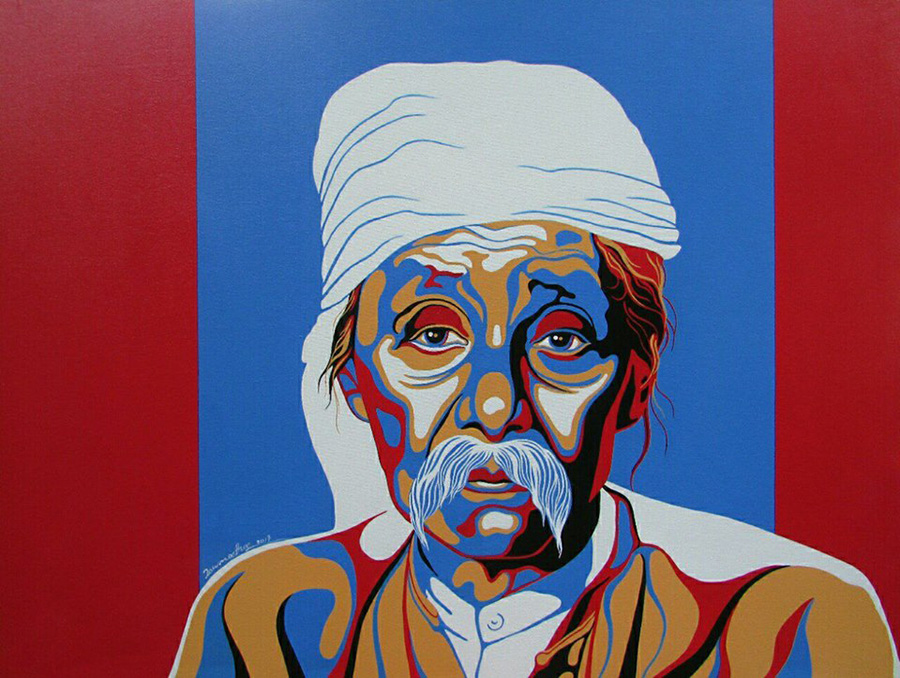 Other figures include Ludu Daw Amar, one of the most respected journalists and writers in Myanmar; musician and composer of Mandalay Myoma Nyein; writer Dagon Taya; painter Paw Oo Thet; writer Mya Than Tint and so on. All were renowned in their fields. The graduate of the National University of Arts and Culture in Mandalay started his career as an illustrator for novels and magazines and had participated in several group shows before he made his debut solo this week. 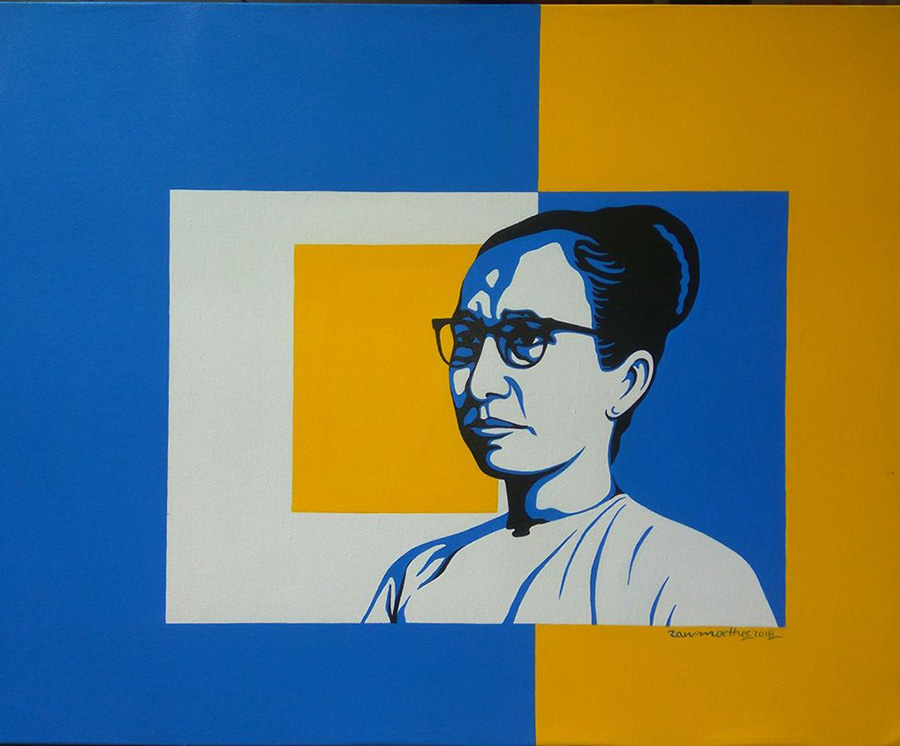 His art exhibition 'Always & Often' will be held at Ahla Thit Gallery on University Avenue Road in Bahan Township through Monday. Paintings are available for purchase for prices ranging from US$300 to US$900. "I like to have a wide color spectrum in the background. I mean to make it look like space. I imagine what it would look like if I put these people that I admire in space," he said. The post Artist Paints Portraits of Longtime Heroes appeared first on The Irrawaddy. |
| USDP Urges Govt to Rethink Naypyitaw Office for UN Envoy Posted: 22 Jun 2018 03:07 AM PDT NAYPYITAW — The opposition Union Solidarity and Development Party (USDP) has urged the government to reconsider its decision to let the UN’s new special envoy on Myanmar set up an office in the administrative capital, Naypyitaw, warning that it could leave the country vulnerable to international interference. "We want our government to think about our sovereignty and our internal affairs. We do not want our sovereign nation to be divided, and our government needs to listen to the voices of our people," USDP spokesman U Thein Tun Oo told reporters in Naypyitaw on Thursday. If the office is unavoidable, he added, the government should at least be transparent about it with the public. UN Secretary-General Antonio Guterres appointed Switzerland’s ambassador to Germany, Christine Schraner Burgener, as special envoy to Myanmar in April. Earlier this month, Myanmar signed a framework deal with the UN Development Program and the UN’s refugee agency aimed at creating the necessary conditions for the safe return of the 700,000 mostly Rohingya Muslims who fled Rakhine State for Bangladesh since August, when attacks by Muslim militants on police posts sparked a military crackdown. The military-aligned USDP is staunchly opposed to international involvement in the Rohingya crisis and accuses the UN — which has called the military crackdown a "textbook case of ethnic cleansing" — of bias. “Who played a role in attracting international attention to the Rakhine issue?” U Thein Tun Oo asked. “When they open an office in Naypyitaw, they will work not only on the Rakhine issue. They will even work on Shan and Kachin issues in order to bring our country before the ICC [International Criminal Court],” he said. Last month the government announced the formation of an independent commission to investigate alleged rights abuses in Rakhine since the militant attacks in August. But the military objected to plans to include a foreign expert on the three-member team, and its representatives spoke against the quota in Parliament. U Thein Tun Oo accused the UN and other international actors of causing the Rohingya crisis and putting the country’s stability at risk. "Was any country stable after allowing the UN to interfere in its internal affairs to solve a conflict? We ask this question. Some countries split apart and became unstable after allowing the UN to interfere in their internal affairs, and in the end, those countries have had to share sovereignty," he said. The spokesman did not say which countries he was referring to. The post USDP Urges Govt to Rethink Naypyitaw Office for UN Envoy appeared first on The Irrawaddy. |
| Taxi Driver Sentenced to Death for Rape and Murder of FDA Worker Posted: 22 Jun 2018 02:44 AM PDT MANDALAY — A taxi driver convicted of raping and murdering an employee of the Ministry of Health's Food and Drug Administration (FDA) was sentenced to death on Friday, the final day of his trial at Yangon Eastern District Court. Myo Zaw Oo, a.k.a Sedona, was arrested and charged under the Myanmar Penal Code for the rape and murder of Ma Shwe Yee Win, 26, a deputy supervisor of the FDA, in January. He was arrested three days after her body was found. "The culprit was found guilty of the rape and murder of Ma Shwe Yee Win and the court handed down its decision according to the law," U Tun Tun Oo, the spokesperson of Yangon Eastern District court, told journalists after the court session. Since the defendant has the right to submit an appeal to a higher court within seven days, his lawyer, U Maung Maung Soe, said he would talk to his client and submit the appeal in time. Family members and friends of Ma Shwe Yee Win who were present at the court told journalists they were satisfied with the decision. Ma Shwe Yee Win hailed Myo Zaw Oo's taxi to take her to her home in Dagon Township from the Hledan Center. After failing to hear from her, her family filed a missing person report and police found her naked body near Nga Moe Yeik Creek in North Dagon Township the next morning. According to police statements, the two began to argue when the driver asked for a higher fare. Myo Zaw Oo then choked his passenger and stabbed her in the throat with a screwdriver. The police statement says Ma Shwe Yi Win lost consciousness as Myo Zaw Oo drove her to North Dagon, where he raped her near a sports field and left her body after taking her belongings, including a platinum necklace, earrings and a mobile phone. The death of Ma Shwe Yi Win raised public security concerns and triggered calls for rapists to be given the death penalty. The Irrawaddy reporter Zue Zue contributed to this story from Yangon. The post Taxi Driver Sentenced to Death for Rape and Murder of FDA Worker appeared first on The Irrawaddy. |
| Yangon’s Govt and Parliament at Odds Posted: 22 Jun 2018 12:02 AM PDT U Kyaw Zeya, the lawmaker representing Dagon Township in Yangon's regional Parliament, recently spoke to The Irrawaddy's Thazin Hlaing about the recent confrontation between the regional Parliament and government over the latter's proposal to purchase 10 Ford cars for government officials and invest nearly 7 billion kyats (US$5.1 million) in the city's municipal bank to engage in overseas banking services. The regional government has proposed a number of long-term projects two and half years into taking office. Why does it want to implement so many projects? We have been waiting for a long time to discuss the new Yangon city project, which people are interested in. The regional government finally presented it at the sixth regular session of Parliament. But it is presenting projects in an unreasonable manner. It has proposed projects related to local and foreign investment, agricultural and development, a deep-sea port, and urban development. But none of the projects were acceptable to lawmakers. They were incomplete and we demanded additional details. Why did lawmakers find those projects unacceptable? We are halfway through our term and most of the proposed projects were long-term ones. We want short-term projects that can deliver tangible results to the people during our term. But the regional government keeps presenting long-term plans. Considering how the Yangon Bus Service (YBS) upgrade went, some Yangon residents say that the regional government can't walk the walk. What is your assessment as a lawmaker? This was a daydream from the start. When the YBS was introduced, the regional chief minister said that the YBS would be successful within one year. [Regional minister] Daw Nilar Kyaw also echoed this. Their dream was that wealthy people who owned their own cars would start using the YBS for daily transportation because the service would be that good. I'd love it if that were a reality. But it has been a year and a half now. I don't want to say whether the YBS is a success. Just take a look. Are buses uncrowded during rush hour? Have private buses stopped operating? Change [for bus fare] is scarce. The card [payment] system still can't be used. There are still troubles. This is a project that was boldly implemented by the Yangon regional government. Its progress is slow because the management was not good from the very beginning. What priorities do you think the regional government should set? It has been more than two years and we are not yet on the right track. In the next two years, we have to double our stride on the right track. The Yangon regional government tried to do one thing. We declared in our election manifesto that we would make sure that people who are homeless either because of their economic conditions or disaster can live in proper dwellings with human dignity. The regional chief minister made a list of squatters to provide them with proper housing. We lawmakers have time and again asked about this [at Parliament]. The regional security affairs minister replied that more than 2,000 apartments had been built for squatters. However, how many squatters have been given those apartments so far? The regional government has issued smart cards and squatters are waiting with great expectations [to get an apartment]. If the government can address the problem successfully, it will win the support of the people in the next two years. It would also solve the problem of people squatting in factory compounds in industrial zones. Is it that the regional government can't manage this project properly? We need laws to bring about good management. There are a lot of difficulties facing those who are implementing this on the ground. It is easier said than done to implement projects. But speaking of the management of the regional government, you can see what it's like at just a glance. It said it would establish industrial zones in 11 townships at the same time. Why doesn't it implement it one after another? If they are viable, foreign investment will come. But now, they are disappointed with the current situation. There is plenty of room for improvement in the management of the regional government. Its management is impromptu. Do you think the regional government should continue with its city expansion project? The previous governments established new satellite towns such as Hlaing Tharyar, Shwepyithar, and Dagon townships. Those townships still lack many utilities. There is not sufficient power or water supply. Plots of land were permitted for residential purposes, but houses still haven't been built there. And farming can't be done on those lands. The government should focus on fixing these problems. Even places like Shwepyithar and Hlaing Tharyar have wards and villages that do not have electricity, and the regional government says it will establish industrial zones on the outskirts of Yangon. It should fulfill the requirements of those townships first, rather than undertake big projects just for show. People know what they want and what the government is providing. There has been a lot of friction between the government and Parliament? Is this a good or bad sign? There must be checks and balances between the government and Parliament. It is good that Parliament boldly points out when the government needs to be checked and balanced. Mostly, people accept this. What do you want to say about the regional government doing business? The government has formed public companies. There is no such company in the other 13 regions and states. Only the Yangon regional government is running companies. Personally, I oppose this. The government should not do business. The job of the municipality [Yangon City Development Committee] is to deliver public services [not to operate overseas banking services]. Every year the municipality faces a budget deficit [its revenues from tax collection do not meet its expenditures], and additional funds are given from the Union budget [to meet the expenditures]. But it should operate with its own fund. This is the reason it gave for doing business – to increase its revenues. If it wants to do business, it needs to do it in line with the law and with transparency. People are frustrated that the government said one thing while it was the opposition, and another after it took office. What do you want to say to people about this? The government has said it is time for change. Don't blame the legacy of the previous governments. The current government has to bear both good and bad legacies. Now, people are frustrated. Eighty percent of the people are frustrated. It is the same in Parliament. We have not been able to accomplish what we had said. Our leaders also accept that we have yet to do so. There are many challenges. Our country still can't achieve peace. And there is also Rakhine issue to handle. Take a look at the previous by-election. We won the vote, but the voter turnout was very low compared to that of the 2015 election. People didn't want to vote for the NLD or any party, so they didn't go to the polling stations and turnout was low. This is not good for the country or the party. It is a real cause for concern. What result do you expect in 2020 election? As for Yangon Region, the regional government has to double its efforts to present itself as acceptable to the people. Otherwise, its chances are not very good. Some criticize that Parliament is deliberately going against the government. What would you want to say about that? No, we don't deliberately defy them. Take a public poll and you will see that people support us. But the economy of our country is not good yet. We want our chief ministers to ride in Ford cars. That demand isn't unreasonable. If our economy were good, we would even agree to them traveling in helicopters and planes, not just Ford cars. But their demand is unreasonable considering the reality of the country. There are other things we can consider if old vehicles are beyond repair. They could ask for funds from the Union budget. Although there is criticism that we defy Parliament, some 80 percent of the public supports our efforts. This interview was edited for clarity and brevity. Translated from Burmese by Thet Ko Ko. The post Yangon's Govt and Parliament at Odds appeared first on The Irrawaddy. |
| ICC Gives Myanmar Deadline Over Rohingya Case Jurisdiction Posted: 21 Jun 2018 10:15 PM PDT AMSTERDAM — Judges at the International Criminal Court have given Myanmar a deadline to respond to a prosecution request that they consider hearing a case on the alleged deportation of Rohingya minorities to Bangladesh. In a decision published on Thursday, the judges asked Myanmar to reply by July 27 to the request made in April that the ICC should exercise jurisdiction over the alleged crimes. About 700,000 mostly Muslim Rohingya have fled largely Buddhist Myanmar to Bangladesh after a military crackdown in August that the United Nations has called ethnic cleansing. “Considering that the crime of deportation is alleged to have commenced on the territory of Myanmar, the chamber deems it appropriate to seek observations from the competent authorities of Myanmar on the prosecutor’s request,” the decision said. The world’s first permanent war crimes court does not have automatic jurisdiction in Myanmar because it is not a member state. However, the prosecutor asked the court to look into the Rohingya crisis and a possible prosecution through Bangladesh, which is a member. Prosecutor Fatou Bensouda has argued that, given the cross-border nature of the crime of deportation, a ruling in favor of ICC jurisdiction would be in line with established legal principles. However, she acknowledged uncertainty around the definition of the crime of deportation and limits of the court’s jurisdiction. The judges asked Myanmar to respond to the matter of jurisdiction and circumstances surrounding the crossing of the border by members of the Rohingya minority. The post ICC Gives Myanmar Deadline Over Rohingya Case Jurisdiction appeared first on The Irrawaddy. |
| North, South Korea Discuss Reunion Meetings For Divided Families Posted: 21 Jun 2018 10:00 PM PDT SEOUL — Delegations from North and South Korea met on Friday for talks to arrange the first reunions in about three years for families separated by the Korean War, with the Red Cross paving the way. The effort is among the steps promised by North Korean leader Kim Jong Un and South Korean President Moon Jae-in to improve relations that had deteriorated over the North’s nuclear and missile programs. Friday’s meeting, which began at 10 a.m. in a hotel in North Korea’s tourist destination of Mount Kumgang, comes after the two sides agreed in April to pursue a reunion to mark a common national holiday in August. “We should make active efforts for good results today by trusting and being considerate of each other,” said Pak Yong Il, the leader of the North’s delegation. “We should also part with the past and go down the road our leaders have forged for us,” added Pak, the deputy head of the North’s agency to promote reunification, the Committee for the Peaceful Reunification of the Fatherland. South Korean officials have called for the visits between separated families to resume as a “humanitarian and human rights issue,” especially since many individuals are now in their 80s. Past reunions, some televised, have often unleashed floods of tears, with face-to-face encounters ending in painful separations. The last reunions were held in 2015. The South has also sought to resume video conferences and the delivery of letters among families divided by the border. Since 2000, about 23,676 separated Koreans, from both North and South, have met or interacted through videolink as part of the program, the Hyundai Research Institute thinktank said. By March, 56 percent of the South’s 131,531 applicants for such reunions had died, it added. It was unclear if Pyongyang had dropped a condition it had previously set for resuming the reunions, that Seoul return 12 North Korean women who worked at a North Korea-run restaurant in China and defected to South Korea as a group in 2016. Several of the women said in May they were coerced into leaving, while South Korean officials said they were trying to verify their accounts. As recently as May, the North Korean Red Cross organization urged South Korea to return the women “without delay.” South Korean representatives to the Red Cross talks left on Thursday for the South’s eastern border town of Goseong and set out for the meeting venue in North Korea early on Friday. “We’ll have good discussions on humanitarian issues with North Korea and how we’ll assuage the pain of the 57,000 family members separated,” Park Kyung-seo, the Korean Red Cross president in Seoul who heads the South’s delegation, said on Thursday. Ties have warmed as relations between North Korea and the United States have improved after Kim met US President Donald Trump in Singapore last week in the two nations’ first summit. The 1950-53 Korean War was concluded only with a truce, not a peace treaty, leaving the combatants technically still at war. The post North, South Korea Discuss Reunion Meetings For Divided Families appeared first on The Irrawaddy. |
| ‘Hate Narratives’ from Abroad Drive Myanmar Communities Apart, Suu Kyi Says Posted: 21 Jun 2018 09:50 PM PDT YANGON — “Hate narratives” from abroad have driven communities in Myanmar further apart, the Southeast Asian nation’s leader, Daw Aung San Suu Kyi, said in a social media statement on Thursday. Patience and time are required to restore trust between the communities, Daw Aung San Suu Kyi told Christine Schraner Burgener, the United Nations special envoy on Myanmar on Wednesday, according to the statement on the Nobel Peace laureate’s Facebook page. Since August, nearly 700,000 Rohingya Muslims from mainly Buddhist Myanmar’s northern Rakhine State have fled to Bangladesh following a military response to Rohingya insurgent attacks, the United Nations and aid agencies have said. Many reported killings, rape and arson on a large scale. The United Nations has called the campaign a textbook example of “ethnic cleansing," a charge Myanmar denies. “The state counselor also pointed out that the hate narratives from outside the country have driven the two communities further apart,” the Facebook statement paraphrased Daw Aung San Suu Kyi as saying, without identifying the communities. Daw Aung San Suu Kyi also stressed the need for a forward-looking approach to resolve the issue, it added. Zaw Htay, a spokesman for the government, did not immediately respond to Reuters’ requests to clarify what narratives Daw Aung San Suu Kyi was referring to. In Facebook and Twitter posts since August, Daw Aung San Suu Kyi’s government has shown support for non-Muslims displaced by the violence and blamed the international community for distributing “fake news” about alleged rights abuses. Rohingya in Myanmar are denied citizenship, freedom of movement and access to services such as health care and education. This month, Myanmar and UN agencies signed an outline deal on the return of Rohingya refugees, a warming of ties after a low point hit last year when the government suggested some agencies provided food to Rohingya militants. The post 'Hate Narratives' from Abroad Drive Myanmar Communities Apart, Suu Kyi Says appeared first on The Irrawaddy. |
| You are subscribed to email updates from The Irrawaddy. To stop receiving these emails, you may unsubscribe now. | Email delivery powered by Google |
| Google, 1600 Amphitheatre Parkway, Mountain View, CA 94043, United States | |
